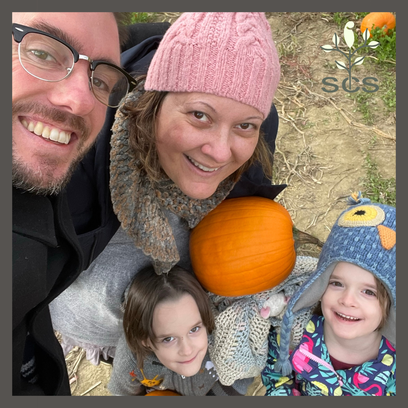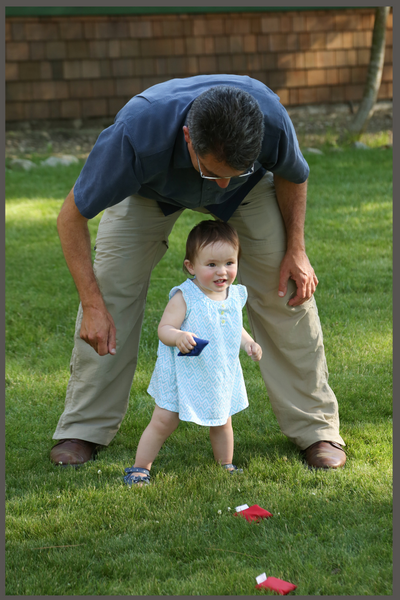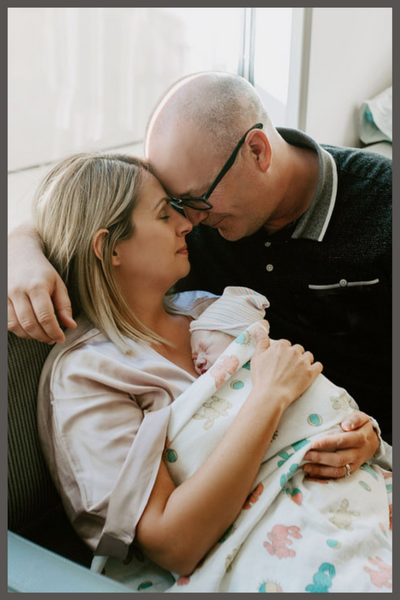We Are Here For YouWe understand that questions, worries and concerns don't hold regular office hours. In a time of need, we are always just a phone call or an email away, even after hours and on weekends. No matter is too small to deserve our attention. Your case is managed by us, working alongside and coordinating with doctors, attorneys and psychologists. As a team, we will do our best to alleviate your risks and fears.
We had a wonderful experience with Supportive Conceptions Surrogacy after having to stop a miserable one with a much higher priced agency. Kim will give you amazing personalized service. |
Support ThroughoutIn addition to being your case manager during the contract, conception and pregnancy process, we believe the time following the birth of your child deserves support as well. While you are in California, we can arrange for meal delivery, household help, nanny services, and postpartum doula support while you adjust to parenthood if needed. The support we offer is unparalleled in the industry.
We see to it that the risks involved are minimized by extensively screening potential surrogates, and working with renowned professionals in the field, experienced in reproductive laws and technologies. You can be rest assured that a thorough background check, home visit, medical evaluation and psychological screening has been conducted. We work with Northern and Central California surrogates, so meeting and spending time together is a reality. This allows us to meet and spend time with every available surrogate in our program. |
Interview with Intended Parents Lora & Mason

What advice would you give couples who might be considering surrogacy?
Mason: Be patient and grow a thick skin because it's a long tough road especially for the guy. You will be largely ignored by medical staff, overlooked, concerns not listened to and marginalized. Everything is about the surrogate and intended mother but you cannot lose yourself in this. You have to put forth a lot of effort to be recognized or you will be left out of the process. Being the intended father is a very lonely position.
Lora: My advice is to do the process in increments. Otherwise, the process can seem daunting. If you plan to create your own embryos, do the egg retrieval first and get your embryos tested. The testing is sooo worth it and you know what you're dealing with. Then focus on finding the right surrogate for your family. Don't compromise on any of your beliefs and ask the tough questions first before getting emotionally invested. Don't waste time. If you see a red flag, stop and be patient to find the right person for you and your family. Once you find your surrogate trust her and be supportive of her needs. If possible, try to go to as many ultrasound appointments. They are super important and it's nice to have that connection with your surrogate. It also gives you the opportunity to talk to the doctor and ask any questions that you may have. The surrogate will have enough on her mind and will not remember every question that you may have. Whenever you meet with medical personnel make a list for yourself in advance. And don't let them rush you. That's your time and the appointment should be finished when you are comfortable with the information given.
What are some of the most common questions you hear when others learn you had your children via surrogacy?
Mason: How much was it? How long did it take?
Lora: I don't really have a good answer to this question because it depends on the person that hears that my children were born through surrogacy. Some people ask me if it was difficult for me to trust another woman to carry out our child. Some ask if it was an international surrogacy because of the stories that are always in the news.
What are some misconceptions that you have heard about surrogacy?
Mason: That they are not genetically our children. It's true for some couples but in our case that was not the case. But you will be asked. Don't take any offense to it. That is one of the more annoying questions that you may get asked.
Lora: Same as what Mason said. People think that my children are not genetically linked to me or Mason because we had a surrogate carry them out for us. Another response I've received was if there are any worries that the surrogate would change their mind and keep my children. I have to explain to people that there are attorneys involved who draw up a contract that's pretty ironclad.
Why did you choose to use SCS for your agency?
Mason: Kim treated us like real people. We were not another statistic and there was no judgement. We didn't have to justify anything. If we had a question Kim was always there for us. On the day our kids were born Kim was on a hike and she literally had to run to her car because she was not near it. She was going to be our doula. We were all caught off guard and we were 3 1/2 hours away.
Lora: Kim was the only agency in Northern California that we knew of and trusted. Every other agency was in Los Angeles and we were living in the Bay Area. The next agency that we were aware of that was north of us was in Oregon. We originally looked at agencies in LA but we didn't like any of them. We interviewed with at least 2-3 agencies before finding Kim. We also tried going independently but without any success. Kim is very resourceful and thorough and she takes an interest in you personally. She tries to find you the best match based on your personality and personal beliefs. She has a good sense for people and it helps that she was a surrogate herself.
How was it, trusting another woman to care for and grow your child(ren)?
Mason: Very difficult. But that's why you need to get to know the person first and have real thick skin. You have to have nerves of steel.
Lora: I trusted my surrogate 100%. She had her own pregnancy and knew her body best. I left it all up to her. But we had similar beliefs and we were on the same page 100%.
Do you have any advice for other intended parents when it comes to trusting someone else with something so important?
Mason: Keep up communication. Your surrogate has to be comfortable with you asking questions. You can't be in the dark for anything. Communication is key. If there is none, don't bother signing up with them.
Lora: During the matching process I had my own set of questions written out and one of the questions that I asked was what their preferred communication mode was and how often we could talk. I think communication is key. I had questions written out for the initial screening and then when we met in person I had another set of questions written out. I only felt comfortable once the surrogate was able to answer all my questions and I was able to gauge if she was the best fit for us.
When and how did you learn the single embryo transfer had resulted in identical twins? What were your first thoughts when you found out?
Mason: I found out first. Kim called me and I took the phone to the bathroom because it was the quietest place in the house because I had the AC running. I about fell in the bathtub when Kim told me. Kim said "do you remember how you were going over sibling names if you ever wanted to have a sibling journey?" It didn't quite register what she was saying. She proceeded to say "you better start using it." I was like "Huh? what do you mean?" and then Kim said "You're having twins... Hello?!" It took me a moment to process what she just shared. Then I called Lora to tell her.
Lora: I was at work having a workshop about the latest Microsoft Word suite. Mason called my cell and I stepped out quickly. He repeated what Kim had told him about needing to pick a sibling name. I was under complete shock and I kept asking him how this was possible. Mason didn't have many answers for me. Then my next thought was what if they were conjoined twins and I asked him if he could find out any information about the ultrasound results. So we hung up quickly and Mason called Kim again and she provided him with all the ultrasound results. I was relieved to find out that they were in separate sacks but they shared the same placenta. There was a lot to learn for us. This was just the beginning.
Had your clinic previously informed you that having twins following a single embryo transfer was possible? How shocked/surprised were you?
Mason: We were informed that with transferring two embryos we had a 30% chance resulting in a twin pregnancy. But having one embryo split in two was like 1%. Not very common. You had more success playing the lottery. It's a fluke or genetic anomaly.
Lora: Since I was a little girl I had a recurring dream of giving birth to two tiny babies that were the size of a pea. I always thought that there was a good chance for me to one day have twins and I often joked about it. My grandfather was a fraternal twin so the chances for me to have fraternal twins was good because it skips a generation. But I didn't think that I would have twins from a single embryo transfer. We intentionally transferred only one embryo because we were trying to avoid having twins. So yes, I was very surprised.
How was your experience as NICU parents since the twins came early?
Mason: NICU was great! They were really professional. We spent way too much time there. We could have worked there as nurses ourselves because we learned so much from the experience. We were very hands-on and we often did everything ourselves. We knew how to operate the incubator and we understood how the monitors worked. When an alarm went off we knew how to shut it down. The only thing we were not allowed to touch were the feeding machines.
Lora: NICU was a great experience because we got to learn how to take care of preemies. I loved snuggling with my babies and doing the skin-to-skin. We were really hands-on parents and the nurses had to kick us out because we had to take care of ourselves. The only uncertainty we had was we didn't know how long we were going to be in the NICU. That was the most difficult part not knowing when you could take your own kids home. At some point it felt like it was dragging on for a long time and I had to put my foot down with the doctors. That was the hardest part. Our babies were delivered 3 1/2 hours from where we lived. After pleading with the doctors they finally released us into the care of the hospital that was closer to where we resided. Our local hospital made the long drive to pick up our twins in an ambulance and drove them back home. We were a total of 6 weeks in the NICU before we got released. I hope that when I'm of retirement age I will volunteer my time in the NICU to snuggle with babies. I told my daughters about it and one of them wants to do it with me.
How is life now that you have the children you dreamed of and worked towards having for years?
Mason: It's challenging. You're doing everything twice. You're going through sleep deprivation with two kids, you're going through potty training with two kids, you're going through teething with two kids, you're going through preschool anxieties with two kids, stranger danger, clothing rebellions, the inevitable tantrum, the two different food preferences - everything is twice. You're dealing with two very different individuals and the competitiveness on top of that... it's not easy.
Lora: Life can be challenging. What Mason said is the reality. The days are long but the years are short. I already miss the infant stage and age 1. I think age 1 was my all-time favorite age thus far. Watching them take their first steps was really exciting. Now they are 5 years old and I can have a real conversation with them. They are very funny and they have a great sense of humor. What's scary to me is how "adult" they act. I have to ask myself are they really five or 15 going on 16? They definitely have their own personalities and their own belief system. Another challenge is that they are twins. People constantly stare at you and ask "are they twins?" Also they get treated differently in school or on the playground because they are twins. That makes it hard.
How did you afford to pursue surrogacy?
Mason: I had to get a second job. We saved every nickel and didn't take any vacations. I sold what artwork I could and drew cartoons for two newspapers and put everything in savings for two years. We also ran a GofundMe campaign and I sold my car. I've been without a car ever since.
Lora: Like Mason I saved up every penny that I could. If you can't afford the whole journey right away my advice is to do it in increments. Freeze your embryos first and get that paid off. Then focus on the agency and the attorney. We also took out a personal loan and that really helped. I evaluated what I could do without. I sold my treadmill and we held some garage sales. I cut as much out as possible. For instance we cut the cable and we stopped going out for meals. I purchased less items for myself. These were the sacrifices we had to make.
How many transfers did it take before you had a viable pregnancy?
Mason and Lora: We had 2 transfers.
Was your embryo tested? When/why/why not?
Mason and Lora: Yes, we tested the embryos. We didn't do it with the first transfer but once that transfer failed we decided to test the embryos. We're so glad we did because out of the 6 we had remaining, only 3 were viable. Plus we were able to find out the gender of our children right away, even before they transferred the embryo. Knowing this early in the process the gender is amazing.
Mason: Be patient and grow a thick skin because it's a long tough road especially for the guy. You will be largely ignored by medical staff, overlooked, concerns not listened to and marginalized. Everything is about the surrogate and intended mother but you cannot lose yourself in this. You have to put forth a lot of effort to be recognized or you will be left out of the process. Being the intended father is a very lonely position.
Lora: My advice is to do the process in increments. Otherwise, the process can seem daunting. If you plan to create your own embryos, do the egg retrieval first and get your embryos tested. The testing is sooo worth it and you know what you're dealing with. Then focus on finding the right surrogate for your family. Don't compromise on any of your beliefs and ask the tough questions first before getting emotionally invested. Don't waste time. If you see a red flag, stop and be patient to find the right person for you and your family. Once you find your surrogate trust her and be supportive of her needs. If possible, try to go to as many ultrasound appointments. They are super important and it's nice to have that connection with your surrogate. It also gives you the opportunity to talk to the doctor and ask any questions that you may have. The surrogate will have enough on her mind and will not remember every question that you may have. Whenever you meet with medical personnel make a list for yourself in advance. And don't let them rush you. That's your time and the appointment should be finished when you are comfortable with the information given.
What are some of the most common questions you hear when others learn you had your children via surrogacy?
Mason: How much was it? How long did it take?
Lora: I don't really have a good answer to this question because it depends on the person that hears that my children were born through surrogacy. Some people ask me if it was difficult for me to trust another woman to carry out our child. Some ask if it was an international surrogacy because of the stories that are always in the news.
What are some misconceptions that you have heard about surrogacy?
Mason: That they are not genetically our children. It's true for some couples but in our case that was not the case. But you will be asked. Don't take any offense to it. That is one of the more annoying questions that you may get asked.
Lora: Same as what Mason said. People think that my children are not genetically linked to me or Mason because we had a surrogate carry them out for us. Another response I've received was if there are any worries that the surrogate would change their mind and keep my children. I have to explain to people that there are attorneys involved who draw up a contract that's pretty ironclad.
Why did you choose to use SCS for your agency?
Mason: Kim treated us like real people. We were not another statistic and there was no judgement. We didn't have to justify anything. If we had a question Kim was always there for us. On the day our kids were born Kim was on a hike and she literally had to run to her car because she was not near it. She was going to be our doula. We were all caught off guard and we were 3 1/2 hours away.
Lora: Kim was the only agency in Northern California that we knew of and trusted. Every other agency was in Los Angeles and we were living in the Bay Area. The next agency that we were aware of that was north of us was in Oregon. We originally looked at agencies in LA but we didn't like any of them. We interviewed with at least 2-3 agencies before finding Kim. We also tried going independently but without any success. Kim is very resourceful and thorough and she takes an interest in you personally. She tries to find you the best match based on your personality and personal beliefs. She has a good sense for people and it helps that she was a surrogate herself.
How was it, trusting another woman to care for and grow your child(ren)?
Mason: Very difficult. But that's why you need to get to know the person first and have real thick skin. You have to have nerves of steel.
Lora: I trusted my surrogate 100%. She had her own pregnancy and knew her body best. I left it all up to her. But we had similar beliefs and we were on the same page 100%.
Do you have any advice for other intended parents when it comes to trusting someone else with something so important?
Mason: Keep up communication. Your surrogate has to be comfortable with you asking questions. You can't be in the dark for anything. Communication is key. If there is none, don't bother signing up with them.
Lora: During the matching process I had my own set of questions written out and one of the questions that I asked was what their preferred communication mode was and how often we could talk. I think communication is key. I had questions written out for the initial screening and then when we met in person I had another set of questions written out. I only felt comfortable once the surrogate was able to answer all my questions and I was able to gauge if she was the best fit for us.
When and how did you learn the single embryo transfer had resulted in identical twins? What were your first thoughts when you found out?
Mason: I found out first. Kim called me and I took the phone to the bathroom because it was the quietest place in the house because I had the AC running. I about fell in the bathtub when Kim told me. Kim said "do you remember how you were going over sibling names if you ever wanted to have a sibling journey?" It didn't quite register what she was saying. She proceeded to say "you better start using it." I was like "Huh? what do you mean?" and then Kim said "You're having twins... Hello?!" It took me a moment to process what she just shared. Then I called Lora to tell her.
Lora: I was at work having a workshop about the latest Microsoft Word suite. Mason called my cell and I stepped out quickly. He repeated what Kim had told him about needing to pick a sibling name. I was under complete shock and I kept asking him how this was possible. Mason didn't have many answers for me. Then my next thought was what if they were conjoined twins and I asked him if he could find out any information about the ultrasound results. So we hung up quickly and Mason called Kim again and she provided him with all the ultrasound results. I was relieved to find out that they were in separate sacks but they shared the same placenta. There was a lot to learn for us. This was just the beginning.
Had your clinic previously informed you that having twins following a single embryo transfer was possible? How shocked/surprised were you?
Mason: We were informed that with transferring two embryos we had a 30% chance resulting in a twin pregnancy. But having one embryo split in two was like 1%. Not very common. You had more success playing the lottery. It's a fluke or genetic anomaly.
Lora: Since I was a little girl I had a recurring dream of giving birth to two tiny babies that were the size of a pea. I always thought that there was a good chance for me to one day have twins and I often joked about it. My grandfather was a fraternal twin so the chances for me to have fraternal twins was good because it skips a generation. But I didn't think that I would have twins from a single embryo transfer. We intentionally transferred only one embryo because we were trying to avoid having twins. So yes, I was very surprised.
How was your experience as NICU parents since the twins came early?
Mason: NICU was great! They were really professional. We spent way too much time there. We could have worked there as nurses ourselves because we learned so much from the experience. We were very hands-on and we often did everything ourselves. We knew how to operate the incubator and we understood how the monitors worked. When an alarm went off we knew how to shut it down. The only thing we were not allowed to touch were the feeding machines.
Lora: NICU was a great experience because we got to learn how to take care of preemies. I loved snuggling with my babies and doing the skin-to-skin. We were really hands-on parents and the nurses had to kick us out because we had to take care of ourselves. The only uncertainty we had was we didn't know how long we were going to be in the NICU. That was the most difficult part not knowing when you could take your own kids home. At some point it felt like it was dragging on for a long time and I had to put my foot down with the doctors. That was the hardest part. Our babies were delivered 3 1/2 hours from where we lived. After pleading with the doctors they finally released us into the care of the hospital that was closer to where we resided. Our local hospital made the long drive to pick up our twins in an ambulance and drove them back home. We were a total of 6 weeks in the NICU before we got released. I hope that when I'm of retirement age I will volunteer my time in the NICU to snuggle with babies. I told my daughters about it and one of them wants to do it with me.
How is life now that you have the children you dreamed of and worked towards having for years?
Mason: It's challenging. You're doing everything twice. You're going through sleep deprivation with two kids, you're going through potty training with two kids, you're going through teething with two kids, you're going through preschool anxieties with two kids, stranger danger, clothing rebellions, the inevitable tantrum, the two different food preferences - everything is twice. You're dealing with two very different individuals and the competitiveness on top of that... it's not easy.
Lora: Life can be challenging. What Mason said is the reality. The days are long but the years are short. I already miss the infant stage and age 1. I think age 1 was my all-time favorite age thus far. Watching them take their first steps was really exciting. Now they are 5 years old and I can have a real conversation with them. They are very funny and they have a great sense of humor. What's scary to me is how "adult" they act. I have to ask myself are they really five or 15 going on 16? They definitely have their own personalities and their own belief system. Another challenge is that they are twins. People constantly stare at you and ask "are they twins?" Also they get treated differently in school or on the playground because they are twins. That makes it hard.
How did you afford to pursue surrogacy?
Mason: I had to get a second job. We saved every nickel and didn't take any vacations. I sold what artwork I could and drew cartoons for two newspapers and put everything in savings for two years. We also ran a GofundMe campaign and I sold my car. I've been without a car ever since.
Lora: Like Mason I saved up every penny that I could. If you can't afford the whole journey right away my advice is to do it in increments. Freeze your embryos first and get that paid off. Then focus on the agency and the attorney. We also took out a personal loan and that really helped. I evaluated what I could do without. I sold my treadmill and we held some garage sales. I cut as much out as possible. For instance we cut the cable and we stopped going out for meals. I purchased less items for myself. These were the sacrifices we had to make.
How many transfers did it take before you had a viable pregnancy?
Mason and Lora: We had 2 transfers.
Was your embryo tested? When/why/why not?
Mason and Lora: Yes, we tested the embryos. We didn't do it with the first transfer but once that transfer failed we decided to test the embryos. We're so glad we did because out of the 6 we had remaining, only 3 were viable. Plus we were able to find out the gender of our children right away, even before they transferred the embryo. Knowing this early in the process the gender is amazing.





